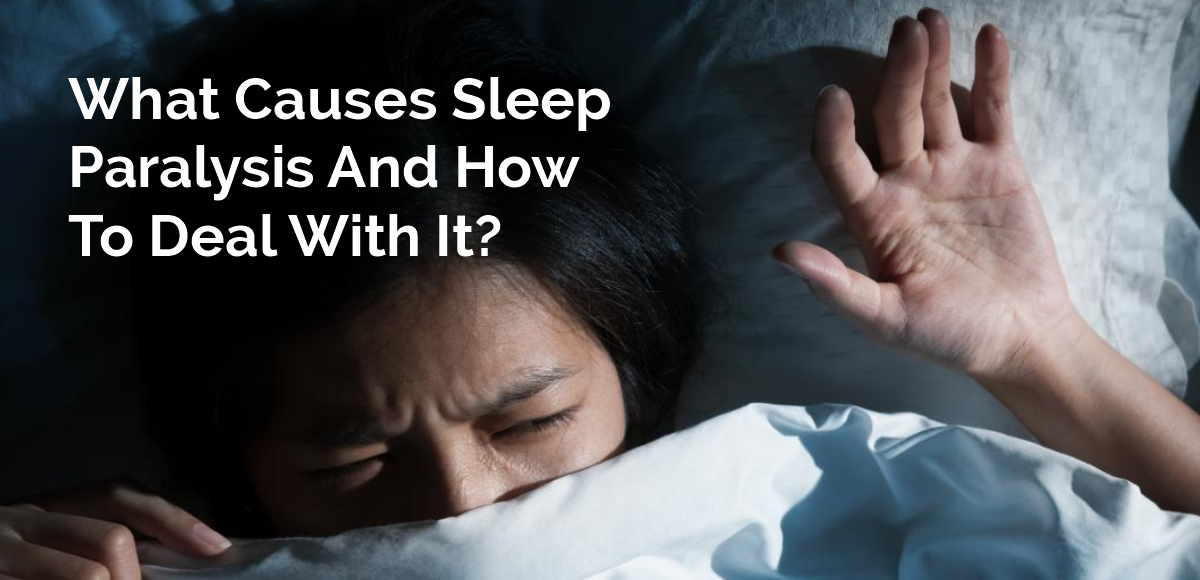

Sometimes early in the morning, you wake up suddenly feeling lost and frightened. The feeling of dread surrounds you, and you suspect someone in your room. You start hallucinating about weird creatures or demons near you.
On experiencing such a thing, you can see everything, and you are alert but cannot move even a muscle of yours. You start feeling as if someone is pressing your chest or choking. Such experience is known as sleep paralysis. Although it is not harmful, it just happens for a few seconds to a few minutes, and when you are relaxed.
Some of the leading causes of sleep paralysis include:
Rapid eye movements ( REM )
Rapid eye movement also referred to as REM, is when your brain is active while your body and muscles are inactive and sleeping. REM is often the main cause of sleep paralysis.
Not getting enough sleep.
Improper sleep is also considered one of the causes of sleep paralysis. Not getting enough sleep can affect you physically and mentally.
Drugs
Good use of drugs like heroin and cocaine can start sleep paralysis.
Sleeping on back
While sleeping, sleeping posture plays the game. Wrong sleeping posture or sleeping on the back can cause sleep paralysis.
Poor mental health
People who have a mental disorder are the primary victims of sleep paralysis.
Stress
Stress and anxiety cause sleep to get deprived and causes sleep paralysis.
Sleeping disorders
Certain sleeping disorders like narcolepsy can cause sleep paralysis.
Use of some medications
Medicines harm sleep and may affect you to suffer sleep paralysis.
Types Of Sleep Paralysis
Sleep paralysis is not related even a bit with nightmares. In sleep paralysis, your brain is awake while your body is sleeping. Sleep paralysis is of two types. Namely hypnogogic and hypnopompic. The types are based on the time when sleep paralysis occurs.
Hypnagogic
Hypnagogic is also called predormital, which occurs just before falling asleep.
Hypnopompic
Hypnopompic is also called postdormital, which occurs just after waking up.
How to avoid Sleep paralysis?
Sleep disorders cause Sleep paralysis. Some of the factors to be followed to avoid sleep paralysis are:
Poor mental health
Mental health problems are related to sleep paralysis. They may include anxiety and depression.
Narcolepsy
Narcolepsy is a kind of sleep disorder, which makes you unable to sleep at night as you have excessive and uncontrollable sleep in the daytime. Avoiding sleeping in the day raises the chances of getting sleep at night.
Bipolar disorder
Bipolar disorder has a higher chance of Sleep paralysis, affecting your mental health.
Sleeping on back
Sometimes sleeping on the back makes you feel uncomfortable, which is more likely to sleepless.
There is no treatment provided for sleep paralysis. However, there are some preventive measures and strategies to avoid sleep paralysis. Treating sleeping disorders and mental disorders can help to prevent sleep paralysis.
Go for a health checkup if you are suffering from narcolepsy or for anti-depression drugs to help prevent sleep paralysis. Consulting a sleep specialist to help you with the root of your sleeping disorder with specific lab tests and sleep tests will also help make a difference.
Avoiding coffee or alcohol closer to sleep time can make a huge difference in preventing sleeping disorders. Taking at least 6-8 hours of proper sleep is best to keep your mental health stable. Sleep paralysis is not considered a severe problem among a lot of people. However, if you find any symptoms that bother you, it is always better to consult a doctor.
Some of the ways to get a good sleep at night that one can follow include:
Stay consistent
Sticking to a proper bedtime every day, including weekends, will help you set up a routine.
Eating the right food.
Eating large meals or beverages before bedtime creates uncomfortability, which will ruin your sleep. Eat small and healthy portions to keep up with the rest.
Avoiding stimulants
Cutting out caffeine and nicotine at night is very harmful to your good night's sleep. Even drinking alcoholic drinks and beverages harms good sleep.
Go dim
Switching dim lights makes the atmosphere of sleep. It's better to choose dark and dim lights to calm your body for a good sleep.
Fear is not the solution. Try to stay relaxed and relieve the stress out of your life, especially before bedtime. Try taking enough sleep and taking new positions for a comfortable good night's sleep.
